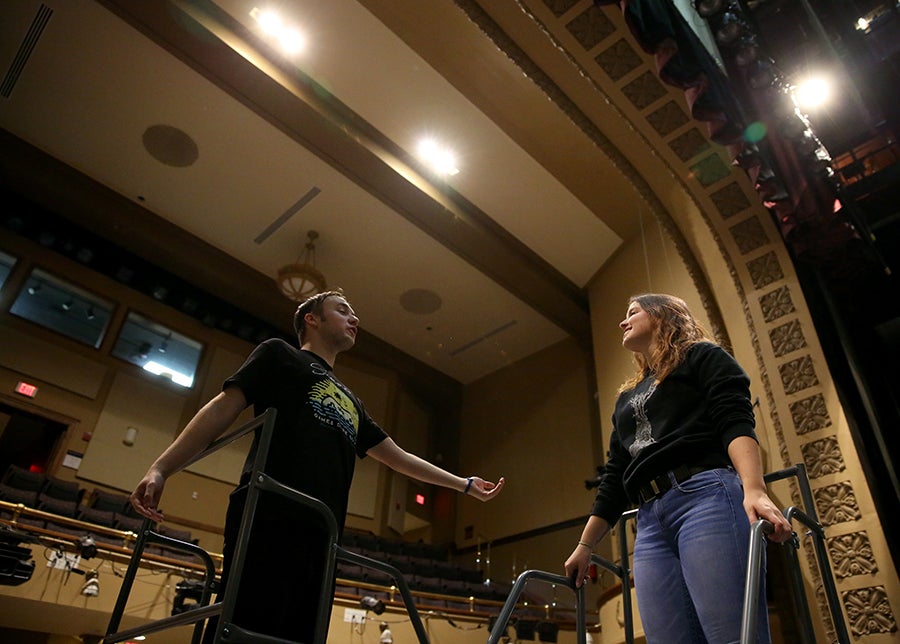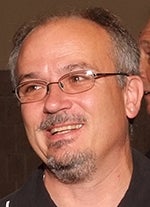University of Wisconsin-Stout student Christian Krohn compares the upcoming University Theatre staging of six short plays in An Evening of One Acts to that of a dinner.
“It’s a six-course meal of different plays,” Krohn said. “You get to sample each one before you go on to the next one.”
The plays are from different genres, including light romantic to sentimentalist and absurdist, said University Theatre Director Paul Calenberg, who is co-directing with Jennifer Sansfacon, assistant professor in communication studies, foreign languages and performing arts department, and Murray Husted, a lecturer in communications studies.
Because most universities choose to put on longer shows, some good literature in one-acts is often ignored, Calenberg said. “It gives us a chance to perform some playwrights and different styles,” Calenberg said. “It also allows students to act in different roles. I do enjoy the intimacy of the small cast. We can really fine-tune the rhythm and emotional arcs.”

An Evening of One Acts is at 7:30 p.m. on Thursday, Nov. 8, through Saturday, Nov. 10, Friday, Nov. 16, and Saturday, Nov. 17, in Harvey Hall Theatre. Tickets are $12 and are available online and at the Memorial Student Center, 715-232-1122.
The content of the plays is for mature audiences.
The one-acts include:
- “Jet of Blood” by Antoin Artaud, which has an apocalyptic feel.
- “The Ballad of Apartment 423 and 424” by Nicholas C. Pappas, which is inspired by Shakespeare’s 23rd Sonnet and addresses how easily we can be at a loss for words when in the presence of a loved one.
- “Andre’s Mother” by Terrence McNally, inspired by the AIDS crisis as a young man strives to create a connection with his significant other’s mother.
- “Rakugo” directed by Murray Husted, a traditional Japanese comedy in which a single performer uses a fan and towel to play multiple characters.
- “The Sandbox” by Edward Albee, focuses on a young man and his relationship with an aging grandmother.
- “Poof!” by Lynn Nottage, addresses abusive relationships.
Krohn, a sophomore majoring in computer science with a concentration in game design from Oakdale, Minn., performs the part of a young man in “Jet of Blood.” “The play relies heavily on images and emotional inputs of the moment,” Krohn said. “It’s meant to make the audience feel something in the moment in an end-of-the-world situation.”
Being a part of college theater allows him to explore more serious roles and expand his acting, Krohn said. He also is in “Andre’s Mother” in the part of Cal. “Cal is trying to connect with her to keep that connection with Andre,” Krohn said.
Krohn wants the audience to think about the messages of the plays. “I want them to have a night to deal with emotions,” he said.
Bria Weyker, a junior majoring in hotel, restaurant and tourism management from Random Lake, is in “Rakugo.” She plays three characters in a story about a man who wants a faster rickshaw driver. “It gives me a chance to experiment with what I can do as an actress,” Weyker said. “It gives you a lot of creative liberties as a performer, which is what I really like.”
She also is in “Jet of Blood,” her first absurdist’s production. “I want people to look at the plays and realize theater is so diverse,” Weyker said. “I want people to see there are different cultures, experiences and tones in theater. I also hope it sparks some thought.”
The cast and their majors are:
- Jonah Brandt, Janesville, real estate property management
- Lois Cassell, New Hope, Minn., psychology
- Spencer Davidsz, Oak Creek, engineering technology
- Jarena Everson, Madison, hotel, restaurant and tourism management
- Jasmine Frederick, Marshfield, graphic design and interactive media
- Ira Hoffman, Morris, Minn., computer science
- Annika Jensen, La Crosse, retail merchandising and management
- Derek Johnson, Riverside, Ill., applied mathematics and computer science
- Dylan Judge-Steuck, St. Paul, Minn., human development and family studies
- Christian Krohn, Oakdale, Minn., computer science-game design
- Danny Leos, Chippewa Falls, professional communication and emerging media
- Theo Linder, Minneapolis, computer science-game design
- Mitchell McGillis, Chippewa Falls, psychology
- Will O’Brien, Rochester, Minn., computer science
- Ryan Vanden Boomen, Green Bay, applied mathematics and computer science
- Bria Weyker, Random Lake, hotel, restaurant and tourism management
- Lillian Gomez, Fort Atkinson, computer science
Production staff includes:
- Megan Ongemach, Greenville, packaging
- Haylie Rinartz, Melrose, special education
- Kaelen Fay, Mukwonago, undeclared
- Izabel Revier, Willard, early childhood education
- Abbigail Bauer, Ellsworth, business administration
- Megan Grindeland, Eagan, Minn., environmental science
- Liz Jeppesen, Sunburg, Minn., hotel, restaurant and tourism management
- Charle Heller, Beaver Dam, hotel, restaurant and tourism management
- Matthew Arndt, Neenah, environmental science
Harvey Hall Theatre reopened in 2011 after renovation and reopened again in 2016 after the renovation of Harvey Hall, which is more than 100 years old. The theater is in the League of Historic American Theatres.
UW-Stout is Wisconsin’s Polytechnic University, with a focus on applied learning, collaboration with business and industry, and career outcomes.
###
Photos
Krohn, left, and Weyker rehearse a scene from “Jet of Blood,” an absurdist’s production. The students hope that the University Theatere’s production of An Evening of One Acts will help people understand how diverse theater is and spark thought.
Paul Calenberg




